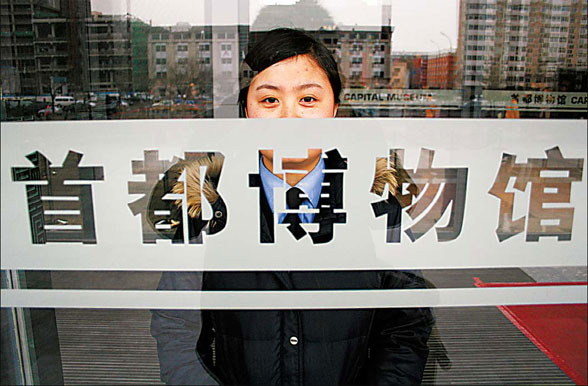Cost of being free
By Lin Qi (China Daily)
Updated: 2008-04-03 10:26
Updated: 2008-04-03 10:26
"Wow, look at that!" Jiang Juan mutters to her boyfriend as she stares at an array of men dressed in old-fashioned robes. In two rows, the four leaders were blowing trumpets, and behind them, two men were raising huge, umbrella-shaped flags. Then followed a conspicuously red sedan chair carried by eight bearers.
"So this is a bride-fetching team in the old time," Jiang says to her companion.
In an exhibition hall on the sixth floor of the Capital Museum, a dynamic showcase of old Beijing's folk scenes is currently being held. Watching the arrangement of a bridal chamber and ingenious street handicraftsmen has proved a real attraction for young people like Jiang.
|
|
Girls and boys, many from outside Beijing judging from their accents, were busying taking photos in front of two closed red wooden gates, which resemble those of an old Chinese mansion. A bunch of primary students lingered on the souvenir counters that sell traditional handicraft decorations despite the teacher's urges to leave.
Jiang was part of the first influx of visitors to the Capital Museum last Friday, when the exhibition opened to the public for free, along with 32 other museums in Beijing.
"We are very excited about the news (that the museums would not charge). We've both asked a day's leave from work just for this visit," Jiang says. "We've learnt much about Beijing's rich history and culture, which differ a lot from that of southern China, where I come from."
"Half of today's tickets were booked. And we have a full complement of reservations for weekend and next week," a staff member says.
To ensure that those who visit the Capital Museum get to see everything, a daily restriction of 3,000 visitors has been set. People should make reservation online or by phone, and show ID cards to get their tickets at the reception booth outside the museum. The museum suggests visitors make reservation a week ahead.
Many visitors complimented the museum on its facilities. Yuan Jujun, a native of Hunan province, came to stay with her daughter's family five months ago.
"I didn't visit the museum before because the ticket was too expensive (30 yuan for permanent exhibitions) for ordinary families," Yuan says. "Now it is great to get a detailed observation of these excellent exhibits free of charge. The staff are kind, patient and ready to help. The museum looks clean and quite advanced."
He Wei came early on Sunday with her parents and friend, and stayed for hours looking through almost all of the displays on every floor. She found that visitors were well ordered both waiting at the ticket booth and inside the exhibition halls, which she attributed to the efficient ticket booking system and control of visitor numbers.
These measures have been widely adopted by the capital's other admission-free museums. In other cities where the museums dropped their entry fee, floods of people squeezed into museums, and put huge strain on services.
While most seemed happy during their museum visits, some had suggestions about how the experience could be improved. Jiang Juan, a porcelain lover, suggests that the introduction boards alongside the exhibits should be more detailed, providing information about when and where the antique was produced, and the genre it represents. She also complains that the Capital Museum charges more than 200 yuan ($28) for a tour guide, which is worthwhile for group audiences but will scare away single visitors.
He Wei says her friend, a Japanese high school student, could understand about only a half of the English interpretations. She says that visitors should also be mindful of their behavior in public, after her parents saw people sleeping on long benches during a recent visit to the Military Museum of the Chinese People's Revolution. "Some seemed to be passengers waiting for the train, as the train station is nearby. It is really a bad image for Beijing," she says.
A staff member from a science museum, who declines to give his full name, says that order should be maintained by the museum and the audience. This is especially true for science museums, which are always packed with children and parents on holidays. He also doubts whether limiting visitor numbers will ease the strain on the facilities.
For community and small museums, like the Museum of Ethnic Costumes of Beijing University of Clothing and Technology, attracting a large audience is the top priority.
"We received nearly 200 people last weekend. There are some group reservations but they are mostly college students or from fashion companies. Visitors outside these circles are rare," says the museum's curator Xu Wen.
The museum houses about 10,000 rare ethnic and ancient costumes, which have been collected from across the country over the past two decades. Xu says that they are currently considering opening for longer than three hours a day.
|
||
|
||
|
|
|
|


